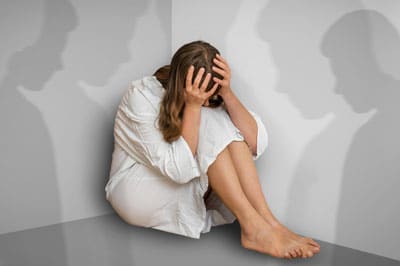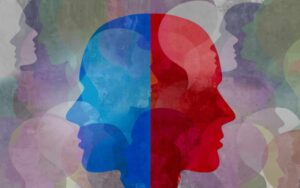Not too many Americans suffer from both schizophrenia and drug use. However, a large portion of those suffering from schizophrenia and drug use go untreated. Those who suffer from mental health disorders such as schizophrenia are certainly at risk for developing substance use disorders. So, having resources is of the utmost importance.
Mental health and illicit drug use is a downward spiral. It hurts people struggling with these chronic health disorders. It also helps loved ones who don’t know how to help. The best option is to seek solace from an addiction treatment center that specializes in co-occurring disorders.
Schizophrenia and Drug Use
A journal within the National Institutes of Health, Dialogues in Clinical Neuroscience, talks about the relationship between schizophrenia and drug use. First of all, they make it clear that these two are highly correlated. The research they cite indicates that 47% of people with schizophrenia also have signs of a substance use disorder. In summary, those with this chronic brain disorder were 4.6 times more likely to develop an addiction to drugs and alcohol.
The abstract from this journal mentions to types of substances people with schizophrenia usually turn to:
Though, that’s not to say that people with this chronic brain disorder don’t use other types of drugs. A dual diagnosis or co-occurring disorder is when a person has a substance use disorder and a mental illness. In a general sense, it’s when two or more health conditions coexist at the same time.
So, schizophrenia and drug use could be a dual diagnosis. Ultimately, this makes treatment more complicated. Although, individuals who receive help from an addiction treatment center can live perfectly normal lives.
What Is Schizophrenia?
According to the American Psychiatric Association (APA), schizophrenia is a chronic brain disorder. It’s quite rare in the scheme of mental disorders. Less than 1% of Americans experience this issue. However, symptoms can be quite severe, terrifying, and wildly realistic. There is no cure for it, but treatment exists to diminish the worst effects.

Men and women experience this chronic brain disorder disproportionally. Stanford Medicine notes in a blog that men are affected by schizophrenia more than women. They mention that the male brain makes them more at risk for this. Men also experience the onset of symptoms earlier than women (teens and early twenties versus twenties and early thirties).
Signs of Schizophrenia and Drug Use
To continue, the signs of schizophrenia and drug use can be broken down into various segments. Yet, it’s worth mentioning that drug use can mask or make schizophrenia’s signs worse (or vice versa). That’s why it’s important to seek help for a dual diagnosis. If anyone demonstrates a single one of these and is known to abuse drugs, it’s time for help.
Schizophrenia in particular has three categories in terms of symptoms:
1. Positive symptoms
These are symptoms that are present among those suffering from schizophrenia. They include visual and auditory hallucinations. For example, they may see a person in front of them that doesn’t exist. Otherwise, they might hear voices or whispers that aren’t real. Positive symptoms also involve paranoia and illusions about reality, like their TV is listening in on them. Another example is believing they are a veteran when they aren’t.
2. Negative symptoms
This category includes symptoms that show a “lack of” something typical people have. For instance, this may be a lack of ability to make plans or stick to them. It also includes an inability to speak, express emotion, or find joy in life. For this reason, schizophrenia might be confused with another disorder like depression or just a substance use disorder on its own.
3. Disorganized symptoms
Confusion is a typical symptom in this category. Also, disordered ways of thinking and speech are others. On top of this, illogical thinking, behaviors, or movements fall into disorganized symptoms. Good examples of this may be stumbling around and inability to answer simple questions. A person with schizophrenia might jump topics with no warning or start talking to themselves.
Schizophrenia and drug use have an overlap of symptoms. Yet, these signs alone could indicate a drug addiction:
- Constantly dilated pupils
- Strange sleeping patterns
- Unexplained bruises and cuts
- Blacking out or browning out from substance use
- A diet based solely on processed, sugary foods
- Health problems that stem from drug and alcohol use
- Asking both loved ones and random acquaintances for money
- Consuming drugs and alcohol at inappropriate times (ie: a kid’s party)
Only a medical professional will be able to tell if an individual suffers from schizophrenia and drug use. Sometimes a doctor won’t be able to tell affright because schizophrenia is such a rare disorder. As previously mentioned, drugs and alcohol can mimic symptoms of this chronic brain disorder. The best option is to seek out an addiction treatment center that specializes in co-occurring disorders.
How Schizophrenia and Drug Use Happen
Mental illness and drug use can be the catalyst for one another. Both can tear lives apart on their own, together they can make a person feel isolated and insane. Most people who suffer from either do not intend to cause issues or get involved in harmful behaviors. They just can’t control themselves anymore. Each health disorder has an onset of symptoms that stems from somewhere. However, certain factors make an individual who is suffering from schizophrenia more at risk of drug use and abuse.
These factors may increase the comorbidity of schizophrenia and a substance use disorder:
- Homelessness
- Using drugs and alcohol at an early age
- A person is incorrectly diagnosed by a doctor
- A psychologically/emotionally traumatic event occurs
- Lack of health insurance forces them to self-medicate
- They can’t afford to see a doctor even with health insurance
- They have a genetic predisposition to addiction or schizophrenia
- Lack of support from friends and family makes them feel crazy and isolated
To expand, groups of marginalized people lack access to healthcare. The United States Census Bureau reports that 8.5% of Americans didn’t have health insurance in 2018. In other words, 27.5 million Americans reported they did not have health insurance that year. People that are too poor to afford proper healthcare have nowhere to turn when they have a crippling disorder.
Drugs and alcohol might give them temporary relief. Both drugs and alcohol in the short-term are cheaper than hundreds spent on help from a medical professional. Also, some people might not have the ability to get an ID. They can’t receive medical attention regularly without an ID. This applies to the homeless population in America. If they have nothing to prove they are who they say they are, there’s little to no chance of getting an ID. Poverty and mental illness in the United States present unique hardships.
The Dangers of Schizophrenia and Drug Use
Continuing, research indicates that schizophrenia and drug use are dangerous. Drug use only worsens the chances of a psychotic break in a person that suffers from schizophrenia. Studies show that what’s considered a “soft drug”, like marijuana, can cause an eruption of psychotic symptoms.
Normally, people logically process stimuli and events. A person with schizophrenia won’t be able to do so. The words that come after “thank you” are a mystery when someone suffers from this. Schizophrenia on its own can make someone feel crazy. Though, some are able to tell that something is not happening. A person who hears whispers in their head can at times deduce it’s not happening. That’s all thrown out the window when a person is on drugs.
What’s worse is that drugs can trigger schizophrenia that was completely dormant before. The National Health Service mentions that, but also says that some drugs can relieve symptoms of this chronic brain disorder. This might seem like a good thing, but it’s not. the more an individual uses drugs and alcohol to escape from their mental illness, the more they build up a dependence. Also, their tolerance will likely go up. Soon, they’ll find that they need more drugs to relieve any bit of their mental illness.
Dual Diagnosis Treatment for Schizophrenia and Drug Use

Dual diagnosis treatment may include:
- Detox
- Inpatient programs
- Outpatient programs
- Intensive outpatient programs (IOP)
- Partial hospitalization programs (PHP)
- Medication-assisted treatment (MAT)
- Individual or group therapy
- Holistic therapy
Likely, therapy will be an important step in the process. Rooting out the source of why a person turns to drug use can alleviate addiction. With this, a therapist at an addiction treatment center will be able to help patients know what to do when they are having a psychotic break.
Additionally, medication-assisted treatment is important to look into. Antipsychotic medication can relieve some of the symptoms of schizophrenia. This reduces the chances and severity of a psychotic break. At the end of the day, it’s up to the discretion of a medical professional to decide what to do.
Free By the Sea Can Help Those Suffering From Schizophrenia and Drug Use
Not every addiction treatment center understands what it takes to help individuals who suffer from schizophrenia and drug use. Free By the Sea specializes in comprehensive, individualized plans to aid those with a dual diagnosis. If you are suffering from either disorder in Washington or Oregon, contact us. We want you to know that you aren’t crazy or a bad person. We’re here to help and know you can overcome mental illness and substance abuse.

Dr. Richard Crabbe joined our team in 2019 as our psychiatrist and medical director. He attended the University of Ghana Medical School where he became a Medical Doctor in 1977. From 1978 through 1984, he was a medical officer in the Ghana Navy and provided a variety of services from general medicine to surgeries. He received his Certificate in General Psychology from the American Board of Psychology and Neurology in 2002.


